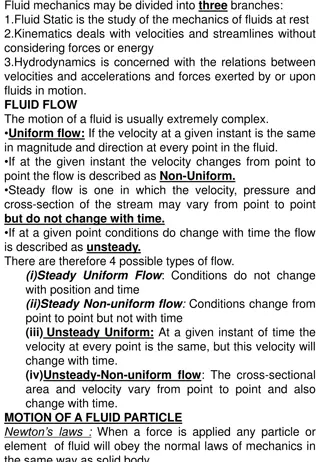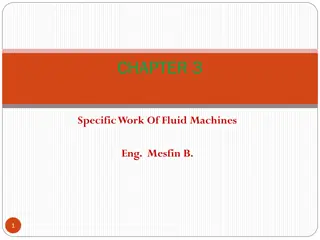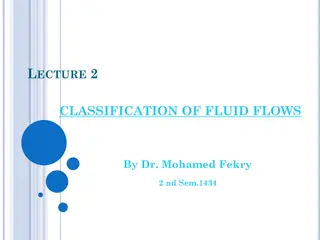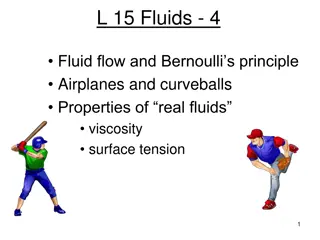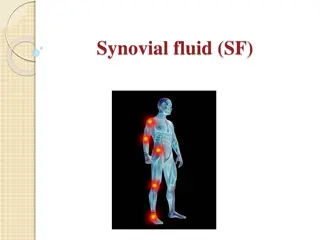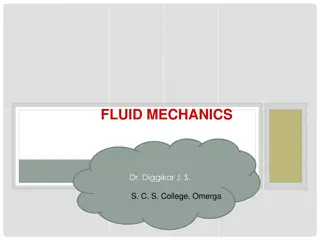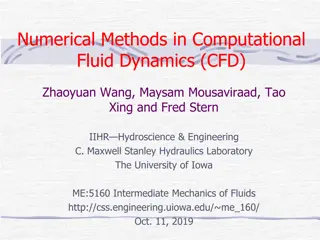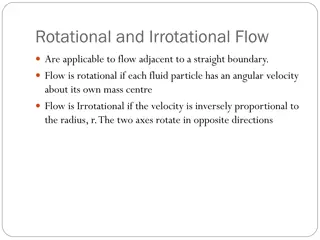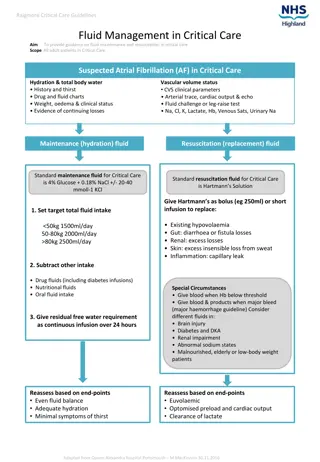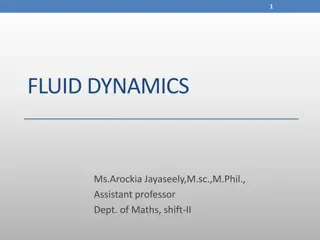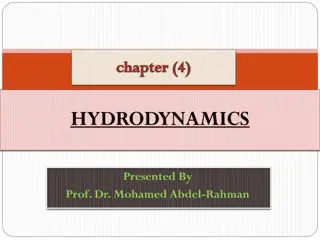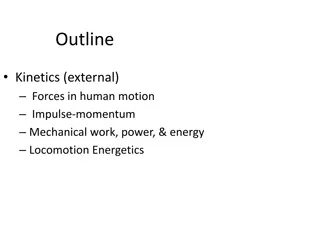Overview of Fluid Mechanics: Branches, Flow Types, and Equations
Fluid mechanics is subdivided into three branches: Fluid Static, Kinematics, and Hydrodynamics. The study of fluid flow includes different types such as uniform, non-uniform, steady, and unsteady flow. The motion of fluid particles obeys Newton's laws, and the conservation of mass and energy plays a
23 views • 4 slides
Fluid Machines: Specific Work and Energy Transfer
In Chapter 3 of "Specific Work of Fluid Machines" by Eng. Mesfin B., the focus is on energy transfer and determination of specific work. The chapter covers topics such as energy loss, total pressure, the Bernoulli equation, and more. Learn how to calculate mechanical energy and power transferred by
4 views • 33 slides
Fluid and Electrolyte Management in Surgical Patients
This article delves into the intricacies of fluid and electrolyte management in surgical patients, covering topics such as total body water distribution, fluid compartments, electrolyte composition, body fluid changes, and disturbances in volume, concentration, and composition. It explores the fluid
3 views • 25 slides
Fluid Mixing in Chemical Reactions
The problems associated with fluid mixing during reactions are crucial for fast reactions in both homogeneous and heterogeneous systems. These issues involve the degree of segregation of the fluid and the timing of mixing. Concepts like RTD are intertwined with fluid mixing, affecting the behavior o
8 views • 46 slides
Fluid Flows in Fluid Mechanics
Fluid Mechanics is the study of fluids in motion or at rest, and their interactions with solids or other fluids. Fluid flows are classified based on various characteristics such as viscous versus inviscid regions, internal versus external flow, compressible versus incompressible flow, laminar versus
5 views • 16 slides
Marine Corps Expeditionary Fluid Analysis System (EFAS) Overview
The USMC Expeditionary Fluid Analysis System (EFAS) led by Mr. Anton Schager is a deployable, real-time fluid analysis system supporting Condition-Based Maintenance for Marine Corps ground equipment. It consists of two tiers - a ruggedized portable analyzer for tactical units and a benchtop analyzer
6 views • 12 slides
Perioperative Fluid Therapy: Key Concepts and Considerations
Understanding perioperative fluid therapy is crucial for maintaining normovolemia, achieving hemodynamic stability, and preventing complications. Factors such as total body water variation, fluid resuscitation goals, desirable outcomes, and fluid and electrolyte regulation play a critical role in en
4 views • 56 slides
Fluid Dynamics and Bernoulli's Principle in Real-world Applications
Explore the fascinating world of fluid dynamics with a focus on Bernoulli's principle through real-life examples like air flow in wind tunnels, airplane wings, and even tornado behavior. Discover how changes in fluid velocity affect pressure and how streamlines provide insights into fluid flow behav
7 views • 23 slides
Synovial Fluid and Its Role in Joint Health
Synovial fluid, also known as joint fluid or synovia, is a plasma dialysate that lubricates joints and allows for smooth movement. It is produced by the synovium and contains important components like hyaluronic acid and lubricin. This fluid reduces friction, provides shock absorption, supplies nutr
1 views • 27 slides
Intravenous Fluid Resuscitation and Blood Transfusion in Clinical Practice
Intravenous fluid resuscitation and blood transfusion are crucial components of patient care, involving the direct administration of fluids and electrolytes to maintain proper fluid balance. When calculating the volume of fluid to be replaced, various factors must be considered, including maintenanc
10 views • 15 slides
Conservation Principles in Fluid Dynamics and Classical Mechanics
Conservation principles play a significant role in fluid dynamics and classical mechanics. In fluid dynamics, conservation of mass, momentum, and energy are crucial for understanding fluid behavior. Classical mechanics, on the other hand, relies on Newton's laws to describe motion and energy conserv
10 views • 46 slides
Fluid Mechanics: Fundamentals and Concepts
Fluid mechanics, presented by Dr. Diggikar J. S. and Terri McMurray, delves into the properties of fluids, such as density and pressure, and explains how pressure changes with depth in a static fluid. Learn about ideal fluids, density calculations, pressure measurements, and the distinction between
1 views • 26 slides
Overview of Numerical Methods in Computational Fluid Dynamics
This material delves into the properties, discretization methods, application in PDEs, grid considerations, linear equations solution, and more involved in Numerical Methods in Computational Fluid Dynamics. It covers approaches to fluid dynamical problems, components of numerical methods, and their
4 views • 40 slides
Computational Play in Early Childhood Education: DLI 2023 Workshop
The workshop at the 8th EAI International Conference on Design, Learning & Innovation (DLI 2023) in Aalborg aims to delve into the application of computational play with mathematics in early childhood education. Through live sessions and discussions, opportunities and challenges in utilizing computa
19 views • 7 slides
Aerodynamic Forces and Moments in Fluid Dynamics
Introduction to aerodynamic forces and moments in the study of fluid dynamics, particularly focusing on air as the primary medium of interest. The discussion covers thermodynamic properties, continuum hypothesis, and fundamental principles of classical mechanics applied to the analysis of aerodynami
4 views • 35 slides
Simulation of Cooling System for PANDA Electromagnetic Calorimeter
A detailed study on optimizing cooling system design for the PANDA electromagnetic calorimeter using Computational Fluid Dynamics (CFD) to enhance temperature stability and light yield efficiency. The simulation focuses on factors like cooling tube arrangement, mass flow rate, and fluid properties i
1 views • 11 slides
Fluid Flow and Measurement Devices
The concept of rotational and irrotational flow adjacent to a straight boundary, along with the dynamics of fluid flows and laws governing fluid flow like the continuity equation and energy equation, are discussed. Insights into devices for flow measurement such as venturimeter, pitot tube, orifices
2 views • 4 slides
Fluid Therapy
Fluid therapy has evolved significantly since the nineteenth century, initially reserved for severely ill patients. Currently, both perioperative patients and those experiencing illness require careful management of fluid intake and losses to prevent dehydration. Increased fluid losses through urine
0 views • 19 slides
Fluid Replacement
This content covers various aspects of pediatric nursing related to fluid replacement, including fluid calculation for intravenous infusions, fluid requirements based on age groups, calorie calculation of intravenous fluids, fluid compartments in infants, fluid losses, and factors influencing insens
3 views • 16 slides
Fluid Management in Critical Care - Guidelines
This document provides guidance on fluid maintenance and resuscitation in critical care settings for adult patients, covering topics such as hydration, total body water, fluid types, maintenance and resuscitation strategies, as well as management of oliguria. It emphasizes the importance of assessin
9 views • 5 slides
FLUID DYNAMICS
World of fluid dynamics, analyzing fluid motion, identifying types of fluids, studying streamlines, and understanding key assumptions. Delve into concepts like pathlines, streaklines, and the impact of steady vs. unsteady flows. Discover the fundamental principles in fluid dynamics presented in a cl
1 views • 11 slides
Computational Biomedical Science Outreach Program - Overview
Delve into the intersection of computational science and biomedical engineering through the Computational Biomedical Science Outreach Program led by Dr. Suzanne Shontz. Explore the application of computational tools in treating conditions like deep vein thrombosis and hydrocephalus. Learn about the
3 views • 29 slides
Hydrodynamics: Bernoulli's Equation and Fluid Flow Analysis
Understanding Bernoulli's equation in hydrodynamics is key to analyzing fluid flow dynamics. As a fluid moves through varying pipe conditions, pressure, speed, and elevation interact to maintain a constant total energy. This principle, expressed in Bernoulli's equation, showcases the relationship be
4 views • 16 slides
Relaxation Techniques in Computational Fluid Dynamics
This content delves into the application of relaxation techniques in Computational Fluid Dynamics, focusing on the analysis of fluid flow using Elliptic Partial Differential Equations. It explains the iterative steps involved in solving equations through relaxation methods for accurate results.
3 views • 11 slides
Human Motion Kinetics: Forces and Fluid Resistance
Exploring the dynamics of forces in human motion, this outline covers topics such as impulse-momentum, mechanical work, power, energy, and locomotion energetics. It delves into the influence of gravity, ground reaction, friction, fluid resistance, and more on human movement, with detailed readings o
59 views • 47 slides
Fluid, Electrolyte and Acid-Base Imbalance Overview
This content provides an in-depth exploration of fluid, electrolyte, and acid-base imbalances, covering fundamental concepts, body fluid compartments, fluid shift classifications, and conditions leading to third spacing. Learning objectives include understanding the role of vital organs in regulatin
0 views • 80 slides
Pediatric Fluid and Electrolyte Management
This content provides detailed information on pediatric fluid and electrolytes management, including fluid distribution, intravenous fluid types, common crystalloid solutions, calculation of maintenance fluid and electrolyte requirements for infants. It covers guidelines for estimating fluid, sodium
3 views • 21 slides
Advanced Insights into Fluid Mechanics
Delve into the intricate world of fluid mechanics with Dr. Afsaneh Mojra from K. N. Toosi University of Technology. Explore the two primary methods of deriving governing equations for fluid motion, understanding the significance of basic conservation laws, and unraveling the complexities of field va
1 views • 44 slides
Fluid Dynamics and Conservation Equations Illustrated with Computational Earth Science
Explore the Navier-Stokes Equation and conservation of momentum in moving fluids, illustrated through computational Earth science. Learn about pressure solving, repeating boundaries, particle tracking, and more in channel flow with eddy simulations. Gain insights into the conservation of quantities
2 views • 44 slides
AL-MUSTANSIRIYAH UNIVERSITY College Mechanical Engineering Department CFD 2015-2016
This document discusses Computational Fluid Dynamics (CFD) in the Mechanical Engineering Department at AL-MUSTANSIRIYAH UNIVERSITY College for the academic year 2015-2016. It covers topics such as steady-state diffusion, transient diffusion, convection-diffusion, pressure-velocity coupling, and the
1 views • 4 slides
Fluid Dynamics: Steady, Unsteady, Incompressible, Viscous
Fluid dynamics involves the study of how fluids behave in different situations. It covers concepts like steady and unsteady flow, incompressible and compressible fluids, viscous and nonviscous flow, as well as streamline flow. The equations of continuity and Bernoulli's equation play key roles in un
2 views • 11 slides
Viscous Force in Fluid Mechanics
Explore the concept of viscous force in fluid mechanics with Dr. Ali Alhafiz. Learn about the impact of friction between fluid molecules, calculation methods for viscous force, and the role of shearing stress in maintaining uniform motion. Dive into the depths of Cartesian and spherical coordinates
0 views • 8 slides
Viscous Fluid Dynamics
Exploring the mathematical principles behind viscous fluids, including the Navier-Stokes equation, viscous stress tensor, and examples of fluid behavior. The lecture delves into the effects of viscosity on fluid motion and stresses. Equations for non-viscous fluids are contrasted with those for visc
3 views • 29 slides
Buoyancy and Fluid Dynamics
Explore the principles of Archimedes, Pascal, and Bernoulli in the context of fluids, buoyancy, and buoyant force. Uncover the relationship between submerged objects, displaced fluid, and the buoyant force acting upon them. Learn how buoyant force is influenced by the weight of the fluid displaced a
4 views • 22 slides
IV Fluid Therapy in Medicine
IV fluid therapy plays a crucial role in medical interventions, with historical roots dating back to the 1832 cholera epidemic. Understanding the physiological aspects of fluid balance is essential for effective treatment strategies. Factors such as body composition, glycocalyx integrity, and fluid
0 views • 13 slides
Fluid and Electrolyte Imbalance in Nursing Education
Learn about the important concepts of fluid and electrolyte imbalance as presented by Miss Aditi Jane, lecturer at IIMT University College of Nursing. Explore the distribution of body fluids, electrolytes in body fluids, mechanisms controlling fluid and electrolyte movement, osmosis and diffusion, f
5 views • 43 slides
Exploring Computational Fluid Dynamics (CFD) in Various Industries
Dive into the world of Computational Fluid Dynamics (CFD) to understand its applications in aerospace, automotive, biomedical, and more. Learn about CFD simulations, advantages, limitations, and where it is commonly used. Discover the physics of fluid dynamics and how CFD helps in predicting fluid f
0 views • 23 slides
Numerical Methods in Computational Fluid Dynamics and Discretization Techniques
Explore the essential concepts of numerical methods in computational fluid dynamics, including discretization methods, finite difference, finite volume, and finite elements. Learn how to transform differential equations into algebraic form and choose the right approach for accurate solutions in flui
2 views • 22 slides
Fluid Mechanics Fundamentals and Applications
Explore the concepts of fluid mechanics in engineering, covering properties of fluids, forces on gates and dams, fluid dynamics, and more. Understand the fundamental units, forces, and weight in fluid systems. Discover the wide-ranging applications of fluid mechanics across various disciplines. Dive
1 views • 20 slides
Computational Fluid Dynamics Fire Modelling.Lavaconsultants
Computational fluid dynamics fire modelling (CFD) from Lavaconsultants.com uses sophisticated simulation techniques to model the behavior of fire, smoke, and heat in various environments. We use CFD to optimize fire safety systems, evaluate building
3 views • 1 slides
